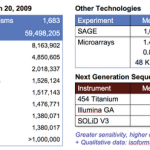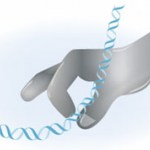Technology
I have a whole pile of science-y book reviews on two of my older blogs, here and here. Both of those blogs have now been largely superseded by or merged into this one. So I'm going to be slowly moving the relevant reviews over here. I'll mostly be doing the posts one or two per weekend and I'll occasionally be merging two or more shorter reviews into one post here.
This one, of Balanced Libraries: Thoughts On Continuity And Change, is from June 6, 2007.
=======
The library literature. I don't know about you, but those three words strike fear in my heart. When I think library literature,…
Rev. Dr. Martin Luther King Jr. cautioned in 1964 about a growing disconnect between technological advances and ethical awareness.
Photo: Dick DeMarsico/New York World-Telegram, courtesy Library of Congress
In honor of Martin Luther King, Jr. Day:
Let us consider his thoughts on science and technology, delivered December 11, 1964 in Oslo when he was awarded the Nobel Peace Prize:
This eloquent speech is prescient of today's challenges.
Unfortunately, there is no lack of evidence of "man's ethical infantilism" today. Here's hoping for growth.
This evening I would like to use this lofty and…
I had the good fortune on Thursday to hear a fascinating talk on deep transcriptome analysis by Chris Mason, Assistant Professor, at the Institute for Computational Biomedicine at
Cornell University.
Several intriguing observations were presented during the talk. I'll present the key points first and then discuss the data.
These data concern the human transcriptome, and at least some of the results are supported by follow on studies with data from the pigmy tailed macaque.
Some of the most interesting points from Mason's talk were:
A large fraction of the existing genome…
Last week, Forbes had an article about the advances in genomics, which focused on the Ion Torrent sequencing platform. It's a good overview of genomics and the Ion Torrent technology, albeit a bit much on the cheerleading side. For instance, this:
Audaciously named the Personal Genome Machine (PGM), the silicon-based device is the smallest and cheapest DNA decoder ever to hit the market. It can read 10 million letters of genetic code, with a high degree of accuracy, in just two hours. Unlike existing DNA scanners the size of mainframes and servers, it fits on a tabletop and sells for only $…
Like so many things, the problem is best explained with an analogy. Imagine a car parked in a dark garage (if you're a mechanic by hobby or trade, make it a computer). Someone hands you keys to the car, a flashlight and a piece of metal that she says belongs to a car similar to the one in the garage. Now, your task is to figure out what that the piece of metal is, and what it's for. Replace car with organism, piece of metal with gene and make the flashlight a whole lot smaller, and you have an idea of what biological research is like. For decades, those wanting to study human genes were like…
This is what I was thinking:
Nationally and globally, the most important events probably included the Earthquake in Haiti (not to minimize the importance of the current, ongoing cholera epidemic there); the dramatic increase of the use of stem cells in therapy (and research) with some real potential for cures just around the corner; Tiger Woods did not get laid all year; Iceland's volcanic eruption and its effects on European travel; New research shows that tigers are about to become extinct in the wild and there isn't much we can do about it, though token efforts will be made; The end of the…
I have a whole pile of science-y book reviews on two of my older blogs, here and here. Both of those blogs have now been largely superseded by or merged into this one. So I'm going to be slowly moving the relevant reviews over here. I'll mostly be doing the posts one or two per weekend and I'll occasionally be merging two or more shorter reviews into one post here.
This one covers two books and is from March 7, 2006:
The Best American Science Writing 2005 by Alan Lightman, editor & Jesse Cohen, series editor
The Best American Science & Nature Writing 2005 by Jonathan Weiner,…
Two recent announcements that are worth noting here.
The first is for Digital Science, a Macmillan / Nature Publishing Group project involving some of the usual science online suspects like Timo Hannay and Kaitlin Thaney and some others in a really dynamic-looking multi-disciplinary team.
The press release is here and the about page here.
Digital Science provides software and information to support researchers and research administrators in their everyday work, with the ultimate aim of making science more productive through the use of technology. As well as developing our own solutions, we…
You just can't shut this crank up. You may recall that he earlier published a paper in an Elsevier journal claiming that all of genetics is wrong, oh, and by the way, the Quran and Bible are right because chromosomes look like ribs. He has a new paper out (only it's actually the same old word salad, freshly tossed), Molecular genetic program (genome) contrasted against non-molecular invisible biosoftware in the light of the Quran and the Bible.
The current perception of biological information as encoded by a chemical structure (genome) is critically examined. Many features assigned to the…
I have a whole pile of science-y book reviews on two of my older blogs, here and here. Both of those blogs have now been largely superseded by or merged into this one. So I'm going to be slowly moving the relevant reviews over here. I'll mostly be doing the posts one or two per weekend and I'll occasionally be merging two or more shorter reviews into one post here.
This one, of Screams of Reason: Mad Science in Modern Culture, is from January 18, 2007.
=======
A little pop-cultural analysis is never a bad thing, taken in small doses. In larger doses, however, it can be a bit problematic…
It is probably true that every culture has child safety devices. It is also probably true that all of these devices are very limited in their effectiveness.
As an anthropologist living with the Efe Pygmies of the Ituri Forest, I often found myself observing some thing ... an object, a construction of some type, or a behavior ... that utterly baffled me. I learned to avoid asking about things as questions occurred to me; The very asking of a question, especially if you are roughly the equivalent of an alien visitor (an extraordinarily wealthy giant scary white being with highly advanced…
"The image is more than an idea. It is a vortex or cluster of fused ideas and is endowed with energy." -Ezra Pound
Back in the 1800s, observational astronomy was already entering its heyday. We had already discovered Uranus, the first planet not visible to the naked eye, knew of a number of comets and asteroids, and had a whole catalog of "bizarre" objects in the sky.
Some turned out to be star clusters, globular clusters, remnants of exploded stars, or other galaxies entirely! But one of the unfortunate things about astronomy around 1800 is that the Southern Hemisphere objects were grossly…
I hadn't heard anything about Dance of the Photons: From Einstein to Quantum Teleportation before it turned up in my mailbox, courtesy of some kind publicist at Farrar, Straus, and Giroux, otherwise I would've been eagerly anticipating it. Anton Zeilinger is a name to conjure with in quantum optics, having built an impressive career out of doing laboratory demonstrations of weird quantum phenomena. He shared the Wolf Prize earlier this year with John Clauser and Alain Aspect, and the three of them are in a small set of people who probably ought to get a Nobel at some point in the near future…
Id like to take a minute to expand upon my post from yesterday--
What I find odd about 'Science Rock Stars' is the way scientists and rock stars were awkwardly mashed together. Like mixing peanut butter and Twizzlers. They are both good independently, but unless youve got a real, obvious reason to mush them together, its weird.
I think it would make more sense, if one was deeply concerned about coolness, to utilize innate 'cool' aspects of scientists lives. As many pointed out in the comments, it would make more sense to interview scientists who were actual rock stars. Or if music was…
From the Editor's Desk: Quantifying Outreach to the Cult of Science | Deep Sea News
"Science needs a reality check too. It has tried to exist in an academic vacuum for much of its existence. The OCD nature science needs behavioral therapy, to be forced to confront its discomfort of engaging with non-scientists. Science also needs to acknowledge that there is value in this engagement. That it is not only the public that benefits from engagement (i.e. science literacy/appreciation), but science benefits just as much. Very few academic institutions wholly recognize this and science's ability…
Last week at the American Public Health Association's annual meeting in Denver, APHA's Occupational Health and Safety section held its awards luncheon - always one of the highlights of the meeting thanks to its combination of stellar awardees and creative musical skit. This year's award winners won well-deserved recognition for the many ways in which they advance occupational health and safety.
Sherry Baron won the 2010 Alice Hamilton Award, which "recognizes the life-long contributions of individuals who have distinguished themselves through a career of hard work and dedication to improve…
Probably. Or, to be more exact, the seasons seem to end later these days than they did in those days, if "those days" is defined as the first decade or so during which reasonably good (though not perfect) data were collected compared to now. A more immediate question may be: When will this year's hurricane season end?
Officially, the Atlantic Hurricane Season runs from June 1st through November 30th.1
I am not certain, but it is probably the case that those dates were picked some time ago in order to include all of the days during which we were likely to have Atlantic storm activity of…
One more day to vote in the , which asks the question "Is Biotechnology compatible with sustainable agriculture?"
PZ Myers answers the question this way: "this is weird: agriculture is biotechnology, and just breaking ground with a sharp stick and throwing some seeds in is an example of an 'unnatural' human practice"
He also publishes the opposition's "top secret email", which has some gobbledy-gook about how farmers are turning against GE crops (um, name one?) and contaminating nature (massive reductions in insecticide use on BT cotton fields and enhanced biodiversity is destruction?). PZ…
This month marks the 10th anniversary of the Needlestick Safety and Prevention Act, which was passed in response to the problem of healthcare workers being exposed to bloodborne pathogens (HIV, hepatitis, etc.) via sharps injuries. The Act directed OSHA to modify its existing bloodborne pathogen standard to require that employers update their exposure control plans to reflect advances in technology (e.g., needleless systems and sharps with injury protection); maintain sharps injury logs; and solicit input from non-managerial employees potentially exposed to contaminated sharps. (View the…
It occurs to me that I ought to thank Mark Hyman, "pioneer of functional medicine," and creator of "Ultrawellness," particularly since he started blogging for that wretched hive of scum and quackery (WHSQ), The Huffington Post. He may not post all that often, but when he does I can be assured that the woo will be flowing in torrents from HuffPo to my computer screen, thus providing me with yet another dose of blogging material. Not surprisingly, given Hyman's history, his latest bit on HuffPo is no different. Entitled Cancer Research: New Science on How to Prevent and Treat Cancer From TEDMED…



